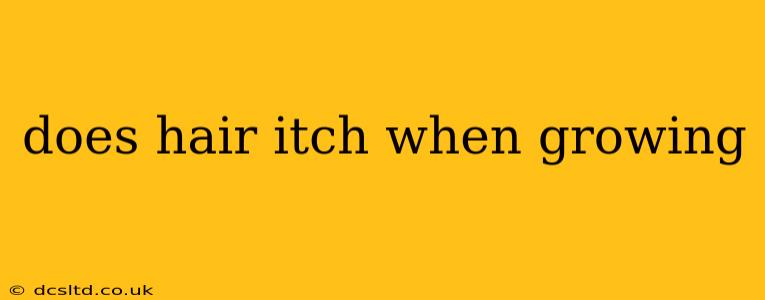The question of whether hair itching signifies growth is a common one, often fueled by anecdotal experiences. While it's tempting to link the two, the reality is more nuanced. Hair itself doesn't actually "itch" as it grows. The itchiness you might experience is usually related to other factors affecting your scalp and hair follicles, rather than the hair growth process itself. Let's delve deeper into the potential causes.
What Causes an Itchy Scalp?
Several factors can contribute to an itchy scalp, leading to the misconception that the itch is connected to hair growth:
-
Dry Scalp: A common culprit. Dry skin produces less oil (sebum), leaving the scalp feeling tight, flaky, and itchy. This is especially prevalent in colder, drier climates or when using harsh shampoos. The itch isn't directly related to hair growth but can coincide with it if you're experiencing seasonal changes or altered hair care routines.
-
Dandruff: Characterized by excessive flaking of the scalp, dandruff can cause intense itching. This condition is often caused by an overgrowth of a type of yeast called Malassezia globosa, which feeds on the scalp's oils. Treatment focuses on antifungal shampoos and maintaining scalp hygiene. Again, the itch is unrelated to the growth of your hair itself.
-
Seborrheic Dermatitis: A chronic inflammatory skin condition, seborrheic dermatitis presents similarly to dandruff but is often more severe. It's linked to inflammation and yeast overgrowth and can cause red, scaly patches, intense itching, and sometimes even yellowish crusts.
-
Psoriasis: An autoimmune disease affecting the skin, psoriasis causes rapid skin cell growth, leading to thick, red, and scaly patches. These patches can be intensely itchy, particularly on the scalp.
-
Eczema: This inflammatory skin condition can appear on various parts of the body, including the scalp. It's characterized by dry, itchy patches, sometimes with blisters or oozing.
-
Head Lice: While less common, head lice can cause intense itching as they feed on scalp blood. This itch is a direct response to the lice infestation, not hair growth.
-
Product Buildup: Using excessive hair products like gels, sprays, or mousses can clog hair follicles, leading to irritation and itching. Regular cleansing and using gentler products can help.
-
Allergic Reactions: Certain hair products or even environmental factors can trigger allergic reactions, resulting in an itchy scalp.
-
Underlying Medical Conditions: In some cases, an intensely itchy scalp may be a symptom of underlying medical conditions. It's important to consult a dermatologist to rule out any such conditions.
Does Faster Hair Growth Cause Itching?
No, the speed of hair growth itself does not cause itching. The feeling of itching is usually a response to irritation, inflammation, or other conditions affecting the scalp. Any perceived correlation is likely coincidental.
How to Relieve Itching
If you experience an itchy scalp, try these strategies:
-
Gentle Cleansing: Use a mild, sulfate-free shampoo to avoid stripping the scalp of its natural oils.
-
Moisturizing: Apply a leave-in conditioner or scalp oil to hydrate the scalp.
-
Regular Scalp Massage: Gently massaging your scalp can improve circulation and reduce itchiness.
-
Over-the-Counter Treatments: For dandruff or mild seborrheic dermatitis, try anti-dandruff shampoos containing ingredients like zinc pyrithione or selenium sulfide.
-
Medical Treatment: If the itching is severe, persistent, or accompanied by other symptoms, consult a dermatologist or healthcare professional. They can diagnose the underlying cause and recommend appropriate treatment.
By understanding the true causes of an itchy scalp, you can address the problem effectively and alleviate discomfort, separating myth from reality regarding hair growth and itching. Remember, consulting a dermatologist is always recommended for persistent or severe itching.
